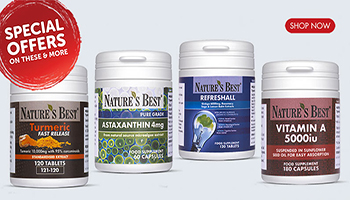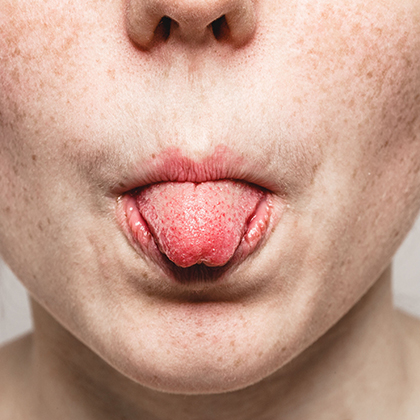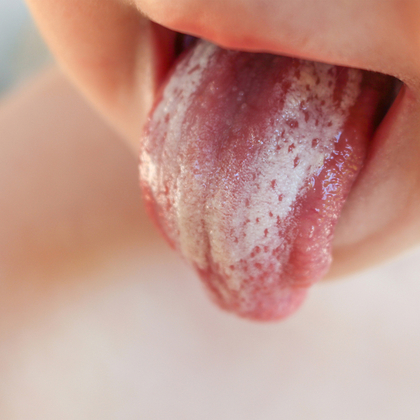Most people suffer from mouth ulcers every now and then, the most common type being aphthous mouth ulcers (at least one in five of us develops them at some point, with women affected more often than men (i)). Also sometimes known as canker sores, some of us tend to get them when we’re run down or under stress.
Little round or oval sores that develop in the mouth, aphthous ulcers can be incredibly painful. That’s because the lining of your mouth is highly sensitive, and when damaged it can make things like eating and drinking very uncomfortable. Thankfully most mouth ulcers aren’t usually a sign of anything serious and should heal without any treatment within about 7 - 10 days (though larger ulcers that can be 10mm or more in diameter can last from two weeks to several months) (i).

There are several causes of aphthous mouth ulcers. Many minor one-off ulcers are the result of accidental damage, such as biting the inside of your cheek or even brushing your teeth too vigorously. But about one in five people have mouth ulcers that keep coming back. Many people who are affected by recurrent mouth ulcers say the problem runs in their family, so doctors believe genetics may also be to blame. Alongside ulcers, pain in your mouth could also be a symptom of burning mouth syndrome.
Stress link
Sometimes there’s an evident trigger for recurrent mouth ulcers, such as stress and anxiety, but often there’s no clear reason. Other known triggers for recurrent mouth ulcers include:
-
Changes in hormone levels (this may explain why women are more prone to mouth ulcers than men, thanks to changes in hormone levels linked with the menstrual cycle, pregnancy and menopause).
-
Giving up smoking (some people find they develop mouth ulcers when they first stop smoking, but they don’t last for long). Drinking an excessive amount of alcohol may also result in mouth ulcers.
-
Certain medical conditions that cause inflammation or have an effect on the immune system, including coeliac disease, Crohn’s disease, HIV, reactive arthritis, lupus and ulcerative colitis. Chemotherapy and radiotherapy – used to treat cancer – can also cause mouth ulcers.
-
Some types of medicines can trigger mouth ulcers, including non-steroidal anti-inflammatory drugs (NSAIDs), nicorandil (used to treat angina) and medicines used to treat high blood pressure called beta blockers (mouth ulcers are thought to be a temporary side effect of these medicines and disappear after a while).
-
Eating acidic foods such as eggs, strawberries, pineapple, coffee, chocolate, tomatoes and peanuts can cause mouth ulcers in some people.
-
An ingredient in many brands of toothpaste called sodium lauryl sulphate.
-
The cold sore virus and other types of viral infections.
-
A deficiency in iron and/or vitamin B12.
When to see your GP
If you get a mouth ulcer that lasts for more than three weeks ask your dentist to check it out, or if you're getting persistent mouth ulcers a visit to your GP may help diagnose any possible underlying health problems.
In the meantime, there are products you can buy over the counter that may help treat a mouth ulcer, including pastilles, liquids and gels. If your mouth ulcer is severe, your GP or dentist may be able to prescribe stronger medicines, including pain relief sprays or mouthwashes.
Mouth ulcers and cancer
Mouth ulcers may be painful but the good news is they are usually harmless. Sometimes, however, a persistent mouth ulcer can be a sign of mouth cancer – though this only happens in a few cases.
According to Cancer Research UK it isn’t yet know what causes all mouth cancers, but some of the risk factors include smoking, drinking alcohol, chewing tobacco, eating a diet low in fruit and vegetables, having a weak immune system and having a family history of mouth cancer (ii).
What are the signs?
The symptoms of mouth cancer can be difficult to spot, especially since some are easily mistaken for a relatively minor problem – such as mouth ulcers. Mouth ulcers that are caused by mouth cancer tend to be long lasting and not healing, and usually appear on or under the tongue (though an ulcer anywhere in the mouth can be a sign of mouth cancer).
Apart from mouth ulcers, the most common signs to look out for include the following:
-
A lump in your mouth
-
A white or red patch on the gums, tongue or lining of the mouth
-
Difficulty swallowing, chewing or moving the jaw or tongue
-
Numbness of the tongue, lips or areas of the mouth
-
A feeling that something is caught in your throat
-
Chronic sore throat or hoarseness
-
Swelling of the jaw that makes dentures uncomfortable or ill-fitting
-
Neck swelling
-
Unexplained tooth mobility
-
Obstruction, ulceration or bloody discharge of the nasal passages
If you’ve had any of the above symptoms for more than two or three weeks – and particularly if you smoke and/or drink a lot – it’s important to see your dentist for a check-up. That’s because if mouth cancer is detected early, you have a good chance of making a complete recovery.
Mouth ulcers: can diet help?
If you have frequent mouth ulcers, it may be a good idea to look at your diet. What you eat when you have a mouth ulcer can also make a difference, as some foods may irritate the inside of your mouth and make you feel even more uncomfortable:
-
Avoid foods that are acidic, including many fruits and fruit juices such as oranges, lemons, grapefruit, tomatoes and cherries, plus anything with vinegar. Other foods that can irritate your mouth include foods with sharp edges, like toast, crackers and biscuits. You may also want to avoid spicy and salty foods.
-
When you have a painful mouth ulcer, choose soft foods that are easy to chew, such as bananas, cottage cheese, mashed potatoes and other vegetables, scrambled eggs and porridge. Make sure you cook everything until it’s soft and tender, and where necessary use a blender to purée your food. If chewing even soft food is painful, stick with soup until your mouth is feeling less sore.
-
Foods that may help prevent mouth ulcers include natural live yoghurt, as well as foods rich in vitamin E (such as spinach and other green vegetables, avocado and many nuts and seeds).
-
Vitamin A foods (or foods that contain beta carotene, a nutrient that converts into vitamin A in the body) may help protect against mouth ulcers and help them heal, including orange, red or yellow vegetables (peppers, carrots, sweet potato, butternut squash).
-
Since mouth ulcers can be a symptom of iron or vitamin B12 deficiency, make sure you also get plenty of iron- and vitamin B12-rich foods in your diet, such as lentils, sardines, mackerel, tuna, shellfish, beans and spinach.
-
Also try sipping ice cold water to sooth a painful mouth or simply suck on an ice cube. Avoid food or drinks that are hot, as they can irritate your mouth.
Self-help for mouth ulcers
Besides diet, there are other things you can try to prevent or ease mouth ulcers as well as help them to heal more quickly.
Avoid stress
Many people find they get mouth ulcers when they are stressed or anxious about something. If this happens to you, learning to relax more could help reduce your stress levels – and your recurrent mouth ulcers. Meditation and focussing on your breathing can help you become more relaxed – or make time to do whatever works for you on a regular basis. Exercise can be a great stress reliever too: aim for at least 150 minutes of moderate-intensity activity every week (try having a brisk half-hour walk on five days during the week).
Be gentle
If you tend to brush your teeth quite hard, try using a soft toothbrush that will have less of a damaging effect on your gums. Ask your dentist to recommend a toothbrush that would be right for you. Also check the ingredients in your toothpaste – if it contains sodium lauryl sulphate, switch to a brand that’s SLS free.
Go natural
Many people believe certain natural treatments may help if you have a mouth ulcer. For instance, a drop or two of tea tree oil in a glass of water can make an effective antiseptic mouthwash and may help heal mouth ulcers. Or make your own herbal mouthwash by making tea from fresh or dried sage leaves. If you prefer to use homeopathic remedies, Nitric ac is often used to treat ulcers on the soft palate, with Mercurius used for ulcers on the tongue. If your ulcer feels better after rinsing with warm water, try Arsenicum.
See your dentist
Sometimes mouth ulcers can be caused by a sharp piece of tooth or a filling that irritates the inside of the cheek. If this is the case, don’t put off going to see your dentist, as the sooner your tooth or filling can be repaired, the faster your mouth ulcers will heal and stop coming back.
Nutritional supplements for mouth ulcers
Mouth ulcers can make you feel very uncomfortable, especially when you’re eating. And they can be notoriously difficult to treat. But there are a few natural supplements that you may find useful:
Vitamin C/bioflavanoids
Bioflavonoids are plant pigments found in all foods that contain vitamin C, and the two nutrients are believed to work together in the body. Both are thought to help with wound healing – which may arguably help provide relief from mouth ulcers – with vitamin C also a key nutrient in the production of collagen, which helps to build new tissue. This may explain why vitamin C is believed to be important for healthy gums.
Quercetin
A bioflavonoid found in onions, apples and black tea, quercetin is thought to have a strong anti-inflammatory effect (iii). As such, it may be useful if your mouth is inflamed and sore, and making it difficult for you to eat. Quercetin is also found in supplement form.
High-strength multivitamin and mineral
Many natural practitioners believe mouth ulcers can be a result of not getting the right amounts of certain nutrients in your diet. If you suffer from frequent mouth ulcers, you may want to consider trying a good-quality multivitamin and mineral supplement, especially one containing decent levels of iron and B vitamins (low levels of both nutrients have been linked with mouth ulcers (i)).
Zinc
Zinc deficiency in is also thought to be linked with frequent mouth ulcers, and there is some evidence that taking zinc supplements could help treat them (iv). A good-quality multivitamin and mineral supplement should provide a decent amount of zinc.
Managing mouth ulcers on a regular basis can be painful, but these steps should have you feeling a lot better. For more articles on a range of other common health conditions, feel free to visit our health library.
References:
-
Available online: https://patient.info/oral-dental-care/mouth-ulcers-leaflet
-
Available online: https://www.cancerresearchuk.org/about-cancer/mouth-cancer/risks-causes
-
Li Y. et al., Quercetin, Inflammation and Immunity. Nutrients. 2016 Mar;8(3):167. Available online: https://www.ncbi.nlm.nih.gov/pmc/articles/PMC4808895/
-
Orbak R. et al., Effects of zinc treatment in patients with recurrent aphthous stomatitis. Dent Mater J. 2003 Mar;22(1):21-9. Available online: https://pubmed.ncbi.nlm.nih.gov/12790293/
Related Posts
Disclaimer: The information presented by Nature's Best is for informational purposes only. It is based on scientific studies (human, animal, or in vitro), clinical experience, or traditional usage as cited in each article. The results reported may not necessarily occur in all individuals. Self-treatment is not recommended for life-threatening conditions that require medical treatment under a doctor's care. For many of the conditions discussed, treatment with prescription or over the counter medication is also available. Consult your doctor, practitioner, and/or pharmacist for any health problem and before using any supplements or before making any changes in prescribed medications.

Christine
Christine Morgan has been a freelance health and wellbeing journalist for almost 20 years, having written for numerous publications including the Daily Mirror, S Magazine, Top Sante, Healthy, Woman & Home, Zest, Allergy, Healthy Times and Pregnancy & Birth; she has also edited several titles such as Women’ Health, Shine’s Real Health & Beauty and All About Health.
View More



